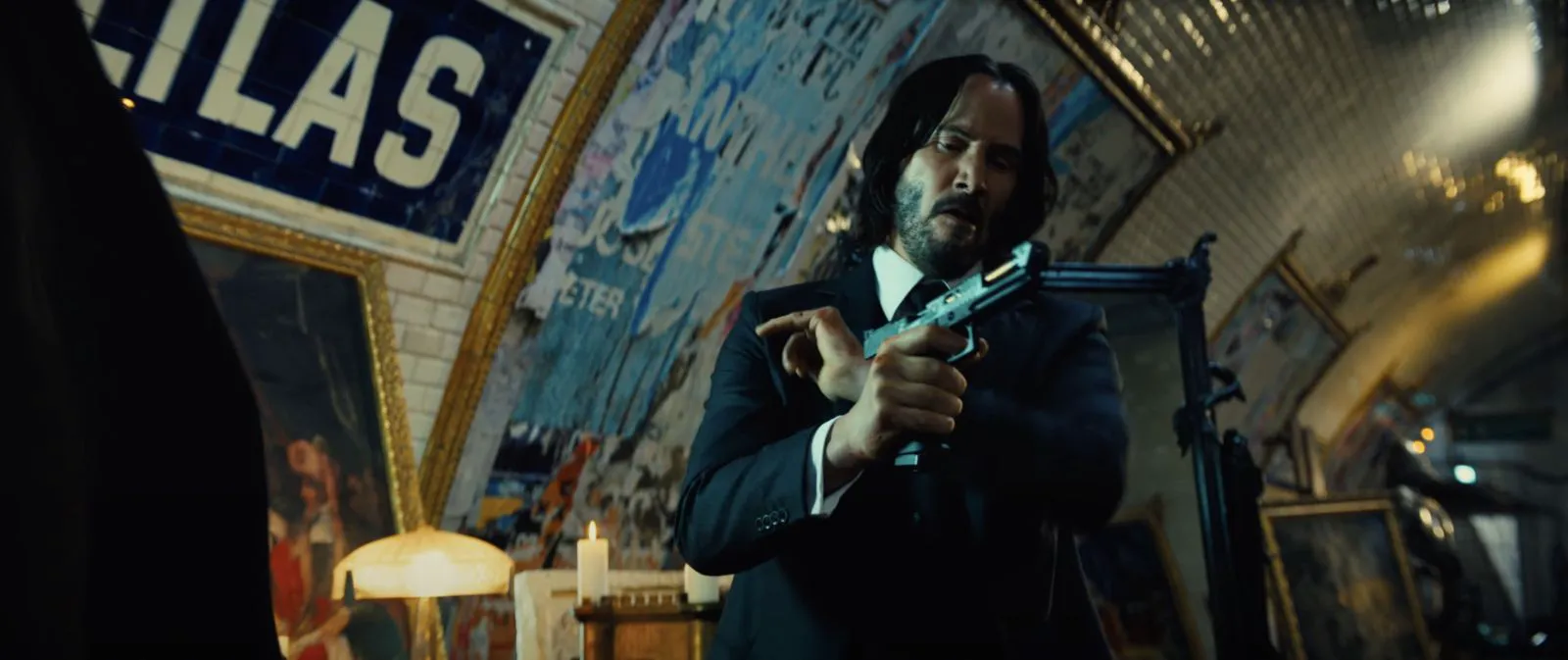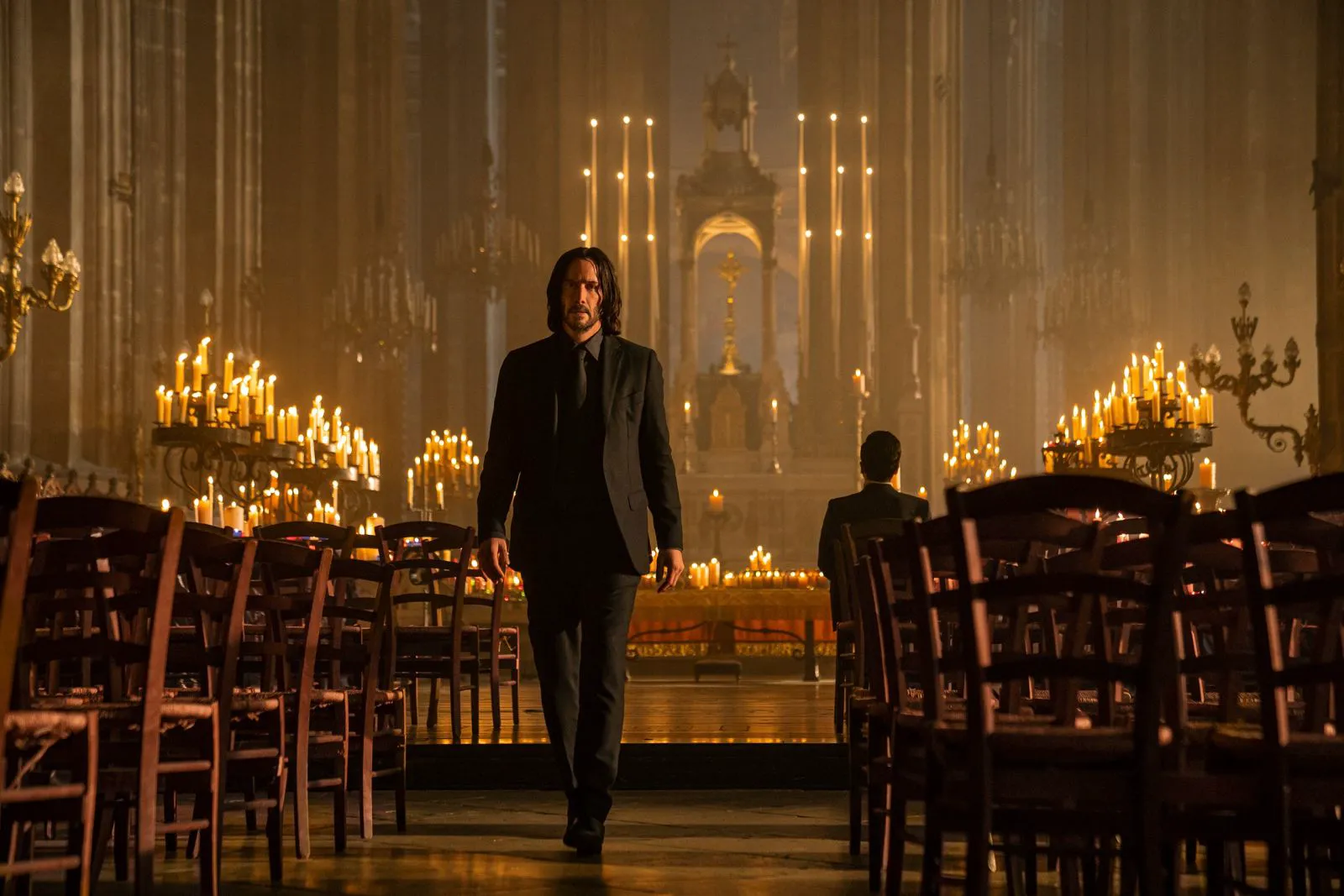Following the unleashed war with the High Table, hitman John Wick (Reeves) continues to eliminate influential figures in the criminal underworld. A new rival emerges in the form of a young Frenchman, the Marquis (Bill Skarsgård), who blackmails Wick using an old and once-loyal comrade codenamed Caine (Donnie Yen).

Keanu Reeves as John Wick in a still from “John Wick: Chapter 4”
Wick is omnipotent: the series originated with the idea of revitalizing Keanu Reeves’ career, ultimately saving, if not humanity, then at least action cinema, which had been on a well-deserved vacation since “Mad Max: Fury Road.” Similarly to “Mad Max,” the fourth installment of “John Wick,” with its stunningly beautiful, choreographed, and patriotically genre-loyal 2 hours and 50 minutes, evolves into a rich, grandiose, anachronistic reflection on honor, revenge, destiny, and consequences. The perennial seriousness of “Wick” has gained irony, but the rituals still resemble a eulogy for both himself and all the loved ones with whom Wick is forced to part sooner or later.

Keanu Reeves as John Wick in a still from “John Wick: Chapter 4”
Wick is insightful: director Chad Stahelski doesn’t reinvent the wheel, but he does add it to the frame in one of the opening scenes. References to pop-cultural heritage alternate with homages to Dante’s “Divine Comedy,” “Lawrence of Arabia,” and the anime “Akira,” delighting with choreographically refined fights and local folklore, punctuated by down-to-earth humor. In a mournful coincidence, viewers are forced to bid farewell to Lance Reddick’s character in the very first minutes: his character, the loyal concierge Charon, falls victim to a new threat. On March 17, a week before the global release, actor Lance Reddick passed away at his home, but his unwavering resilience, courage, and status as a plot-driven “friend” remained invaluable. Watching Charon’s self-sacrifice, Wick contemplates his own demise, believing that the best way to be remembered is as a “loving husband,” bidding farewell to the world.
Wick is immortal: flying from the desert to Osaka, Japan, then to Berlin, and finally to Paris, John engages in a silent dialogue with himself, increasingly contemplating the futility of the world and his own chosen status. If the “Matrix’s” Neo fought for the sake of humanity, Wick has long needed nothing from people, and with this bitter sorrow, the hero undoubtedly earns extra points from touched viewers. Standing apart is Wick’s old friend, the blind Caine (the wonderful Donnie Yen), who carries out villainous orders to save his violinist daughter, whose playing he watches daily.

Donnie Yen as Caine in a still from “John Wick: Chapter 4”
Both perfectly understand that they are unattainable for hordes of faceless enemies, which means they are too old to die young. Watching Reeves and Yen, one clearly realizes that there are not so many true movie stars left—they burn brightest in the hour of the apocalypse. Stahelski, a practicing stuntman who takes equilibristics to an extreme level, understands this, giving both carte blanche. None of the antagonists, whether it’s Skarsgård in changing outfits and the gold of Versailles or the frightening Berlin mafioso Scott Adkins (a worthy rival to Colin Farrell’s Penguin in terms of makeup), have the slightest idea about camaraderie and code. Your blood is my blood: visiting his Gypsy relatives from Belarus, Wick rediscovers home, threading his sacrifice through the entire film, so that he may soon ascend his personal Golgotha in a biblical fashion.
Wick is doomed: concluding the film in a swirling vortex of cars near the Arc de Triomphe and the Sacré-Cœur Basilica (French for “Sacred Heart”), becoming the hero of an impeccable shooter without montage cuts, John reaches perfection and does not forget about his roots in the world of syndicates and endless carnage. Revenge is not the most Christian or noble concept, but in Wick’s hands, it becomes a justified measure, a currency, and salvation. “Are you already dead?” Caine asks in one scene. The response is a meaningful, most righteous silence possible.